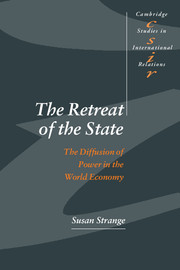Book contents
- Frontmatter
- Contents
- Preface
- Part I Theoretical foundations
- Part II Some empirical evidence
- 6 Authority beyond the state
- 7 Telecoms: the control of communication
- 8 Organised crime: the mafias
- 9 Insurance business: the risk managers
- 10 The Big Six accountants
- 11 Cartels and private protectionism
- 12 International organisations: the econocrats
- Part III Conclusions
- References
- Index
- CAMBRIDGE STUDIES IN INTERNATIONAL RELATIONS
6 - Authority beyond the state
from Part II - Some empirical evidence
Published online by Cambridge University Press: 07 October 2009
- Frontmatter
- Contents
- Preface
- Part I Theoretical foundations
- Part II Some empirical evidence
- 6 Authority beyond the state
- 7 Telecoms: the control of communication
- 8 Organised crime: the mafias
- 9 Insurance business: the risk managers
- 10 The Big Six accountants
- 11 Cartels and private protectionism
- 12 International organisations: the econocrats
- Part III Conclusions
- References
- Index
- CAMBRIDGE STUDIES IN INTERNATIONAL RELATIONS
Summary
Perhaps because of the limitations of conventional political science, as noted in chapter 3, there has been surprisingly little attention paid to non-state authority in society – except perhaps by the sociologists. One result of this neglect is that there is no simple definition that encompasses all the various forms of non-state authority in world society and economy. Nor is there any agreed taxonomy that classifies non-state authority according to some common criterion.
The problem of definition clearly cannot be solved in institutional or organisational terms. There is too much variation between the constitution of, say, a mafia and a partnership in accountancy for that to be feasible (see below). Non-state authority, therefore, can only be determined on the basis of outcomes. It may be exercised directly, by relational power, and indirectly by structural power. The capo of the mafia, or the chief executive of a multinational, mostly exercises relational power. A banker, or an insurer mostly exercises structural power. Indeed, so does any association, organisation or institution other than a state whose decisions indirectly affect the choices of others in society in ways comparable to that produced by the actions of state agencies. Structural power is exercised both by states and by non-state authorities. In both cases, authority over social or economic relations is exercised whenever the choices open to others are changed.
- Type
- Chapter
- Information
- The Retreat of the StateThe Diffusion of Power in the World Economy, pp. 91 - 99Publisher: Cambridge University PressPrint publication year: 1996

